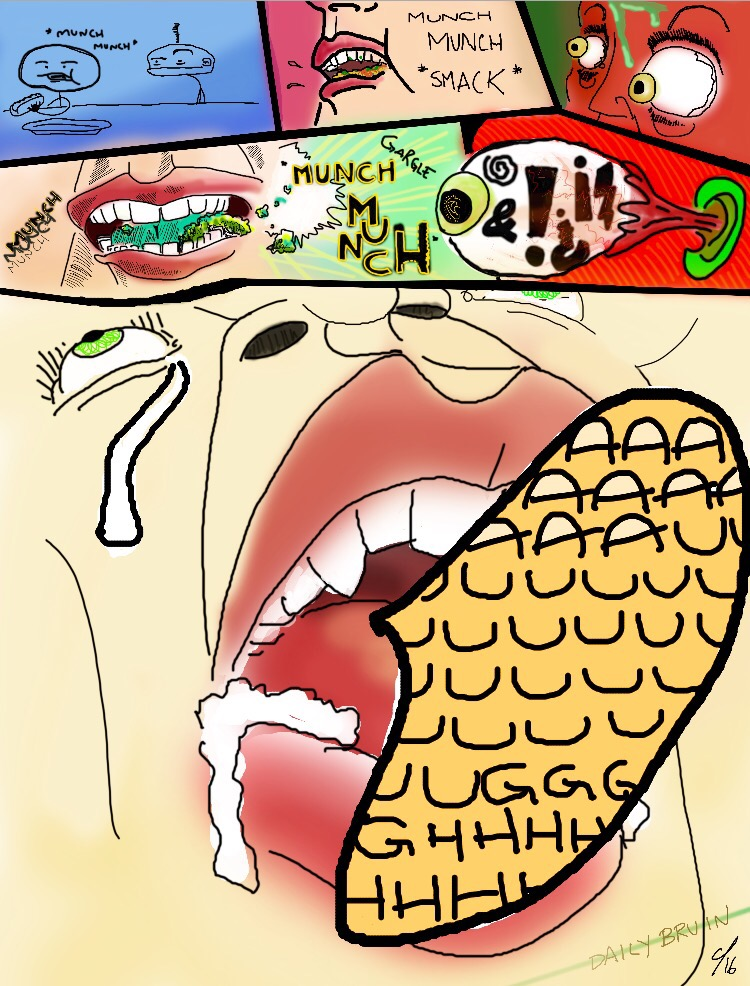The Quad: Explaining misophonia, the hatred of sound

(Cornelius Robbins)
By Laney Chiu
Nov. 18, 2016 6:02 p.m.
Please stop your ragged breathing.
I am going to slap the gum out of your mouth.
Why are you typing so ferociously? I swear, if you don’t stop, I will smash your laptop on the floor.
If you’ve ever had any of the above thoughts, you might have misophonia, also called selective sound sensitivity syndrome.
Misophonia, which translates to the “hatred of sound,” is so named because individuals who have misophonia react strongly and negatively to certain noises that bother them. The auditory triggers are different for every individual, but common irritating sounds include chewing gum, typing, clicking pens, yawning, coughing, sniffling, breathing irregularly or too loudly, smacking lips and chewing.
Depending on the person, the emotional response can range from feeling anger to even displays of aggression. Others feel so uncomfortable in the same room as the noise that they have to leave. Whatever the case may be, those with misophonia have much more adverse reactions to their specific sounds than the average individual.
The current data suggests the brains of those with misophonia exhibit hyperconnectivity between the auditory and limbic systems. The limbic system is associated with emotion regulation, which may be why those with this condition react more intensely than the average person over specific sounds. Other research suggests that misophonia is related to obsessive-compulsive disorder and post-traumatic stress disorder.
If this disorder sounds ridiculous to you, you’re not alone. Many doctors also dismiss its seriousness. In fact, many people aren’t even aware a term exists to describe the condition.
Misophonia is currently not recognized in the most recent edition of the American Psychiatric Association’s “Diagnostic and Statistical Manual of Mental Disorders,” and there’s hot debate as to whether or not it should even be classified as a psychiatric disorder. University of Amsterdam psychiatrist Arjan Schröder is a proponent of recognizing misophonia as a disorder alongside OCD. Yet the original coiners of misophonia, Emory University researchers Pawel and Margaret Jastreboff disagree, saying misophonia involves decreased sound tolerance. They argue that misophonia is simply learned responses to certain sounds, and can be alleviated through therapy.
The disagreement within the scientific community shows that misophonia is a condition that still requires much more research. Performing a Google search on Google Scholar shows only 340 results in comparison to OCD’s 143,000.
But more and more voices are speaking out about this condition. ABC News released a segment on their 2020 Medical Mysteries about actress Kelly Ripa of Live! With Regis and Kelly and her struggles with misophonia. Publications like the magazine Misophonia International are springing up to educate the world on this disorder. There is even a Reddit community, r/misophonia, formed to provide support those with this condition.
There is still much to be learned about misophonia and whether or not it really does qualify as a mental disorder, but the larger life lesson to be learned is human beings are weird. Looking up other rarely-heard-of disorders provides one with a list of almost unbelievable struggles people go through. There is such a thing as Mary Hart syndrome – a woman got seizures upon hearing the actress Mary Hart’s voice. Boanthropy is when people think they are a cow or ox. Erotomania is when people delude themselves into believing someone else is in love with them – in particular, celebrities.
At the rate human civilization is expanding and introducing new stimuli and stresses into our system, it’s no surprise that so many new potential disorders and conditions are cropping up.
Psychology as its own discipline is attributed to have begun less than 150 years ago with scientist Wilhem Wundt, who founded the first psychology laboratory at the University of Leipzig in 1879. Drilling holes into people’s skulls used to be a popular form of treatment. The progress towards comprehensively understanding all of what’s really going on underneath our skull still has a long way to go.
As silly as misophonia and other rare conditions may sound, we should all show some compassion towards one another, rather than assuming people make things up about their health. Though people can exaggerate or underestimate when assessing their own health, and certain conditions may never be recognized as full-fledged diseases, it’s best to not dismiss these complaints so quickly. At the very least, it’s evident that some people have stronger sensitivities to aspects of the world than ourselves.


